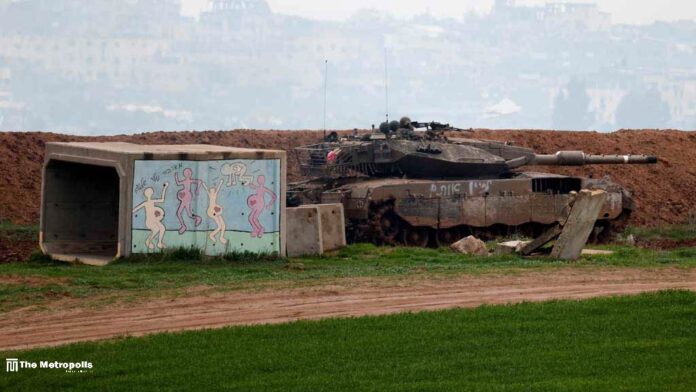Israel has called up military reservists in preparation for a potential resurgence of conflict in Gaza if Hamas fails to meet a Saturday deadline to release additional Israeli hostages, jeopardizing a ceasefire that has been in place for nearly a month.
Concerns about the ceasefire’s stability are escalating amid growing outrage in the Arab world over President Donald Trump’s proposal for the United States to take control of Gaza, relocate its Palestinian population, and establish an international beach resort.
Hamas confirmed that Egypt and Qatar—who, with U.S. backing, brokered the truce that took effect on January 19—have intensified mediation efforts. The militant group’s Gaza leader, Khalil Al-Hayya, has traveled to Cairo for negotiations aimed at resolving the deadlock.
Under the terms of the ceasefire, Hamas had agreed to release three more hostages on Saturday but announced this week that it was suspending the handover, citing alleged Israeli violations of the agreement.
Trump has warned that if all hostages are not freed by noon on Saturday, he will “let hell break out.”
Israeli Defense Minister Israel Katz emphasized that the ceasefire was intended to ensure the swift release of hostages held in harsh conditions in Gaza. “If Hamas stops the hostage releases, then there is no ceasefire—there is war,” he stated at Israel’s defense headquarters in Tel Aviv.
Katz further asserted that the impending conflict would be significantly more intense and would help realize Trump’s vision for Gaza.
“Hamas will not accept American and Israeli threats,” Hamas spokesperson Hazem Qassem said, adding that discussions with mediators are ongoing to uphold the ceasefire agreement.
Israeli Prime Minister Benjamin Netanyahu stated on Tuesday that if Hamas does not comply with the deadline, Israel will resume “intense fighting,” though he did not specify how many hostages must be freed.
Netanyahu has ordered the military to reinforce its presence around Gaza, and additional forces, including reservists, are being deployed to Israel’s southern region.
During a White House meeting with Jordan’s King Abdullah on Tuesday, Trump urged him to ensure that Hamas understands the “severity of the situation” if hostages are not released by Saturday, according to a White House statement on Wednesday.
Rising Fears of Renewed War
The current standoff threatens to reignite a devastating conflict that has displaced most of Gaza’s population, caused severe shortages of food and water, and brought the Middle East to the brink of a broader regional war.
Residents of Gaza are alarmed at the possibility of renewed violence and have called on both Hamas and Israeli leaders to extend the ceasefire.
“We had just started believing in the possibility of peace and a lasting solution,” said Lotfy Abu Taha, a resident of Rafah in southern Gaza. “The people are suffering. We are the victims.”
The armed wing of Islamic Jihad, an ally of Hamas that also holds Israeli hostages, warned that the hostages’ fate depends on Netanyahu’s actions.
“The only way to secure the hostages’ return and restore stability is through a prisoner exchange deal,” its spokesperson said on Telegram.
Meanwhile, Arab nations have strongly opposed Trump’s vision for Gaza. Two Egyptian security sources reported that President Abdel Fattah al-Sisi would not visit Washington if discussions included plans to displace Palestinians. The Egyptian government has not issued an official comment.
Hostage Releases and War Casualties
The conflict began with Hamas’s surprise attack on southern Israel on October 7, 2023, which resulted in at least 1,200 deaths and more than 250 hostages being taken to Gaza, according to Israeli officials.
In response, Israel launched an extensive air and ground campaign against Hamas, which Gaza health authorities say has killed more than 48,000 Palestinians in the densely populated territory.
So far, Hamas has freed 16 Israeli hostages from an initial group of 33 women, children, and elderly captives in exchange for hundreds of Palestinian prisoners. It has also released five Thai hostages.
Negotiators hope the next phase of ceasefire talks will secure the release of the remaining hostages and lead to a full withdrawal of Israeli troops from Gaza.
Palestinians fear a repeat of the “Nakba,” or catastrophe, referring to the displacement of nearly 800,000 people during the 1948 war that led to Israel’s creation. Israel denies claims that they were forcibly expelled. Under Trump’s plan, Palestinians would have no right to return to their land.



